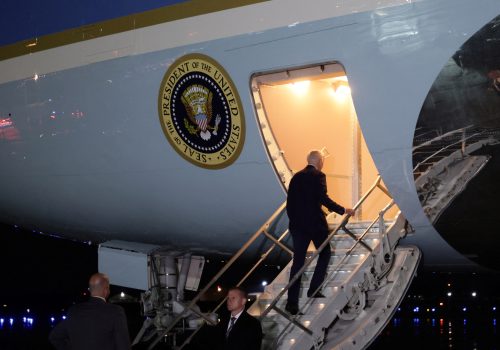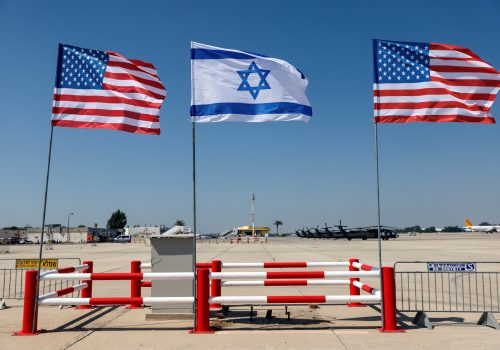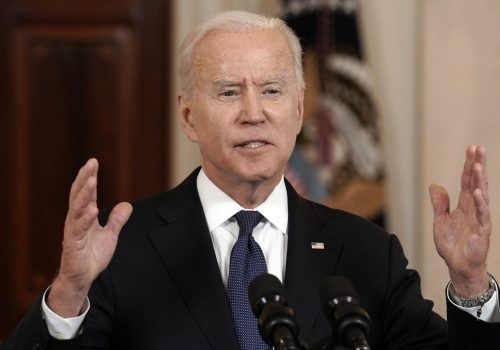US interests and capacity for Middle East stability exist, but President Biden must convey will
If US President Joe Biden wants to foster regional stability, bolster US relationships in the Middle East, and advance normalization with Israel—in addition to the anticipated Jerusalem Declaration to re-affirm US-Israeli security cooperation and commit to denying nuclear capability to Iran—the president has two significant tools provided to him when he took office in 2021.
The Donald Trump administration led the Abraham Accords in 2020 and the January 2021 decision to include Israel in the US Central Command’s (CENTCOM) area of responsibility (AOR). This compelled all Arab capitals to reassess their relationship with Israel. The Abraham Accords were the first official reciprocal agreement any Arab country had signed with Israel in twenty-six years. Furthermore, expansion of the CENTCOM AOR brought regional militaries into the US-led security cooperation space, where Arab military personnel are now able to conduct exercises and training with Israeli counterparts.
Until September 2020, accord signing countries Bahrain and the United Arab Emirates (UAE) didn’t have any official economic or personal relationships with Israel. Moreover, until Israel transferred into the CENTCOM AOR, Bahrain, the UAE, and non-signatory states, like Saudi Arabia, wouldn’t have considered coordinating with Israel on air or maritime defense, or any sort of security cooperation. Factor in the Biden administration’s efforts to revive the 2015 nuclear deal with Iran, threats from Iranian state-sponsored terrorist groups, such as Lebanese Hezbollah, and increasing missile and drone attacks from the Iran-sponsored Houthis in Yemen, and Israel and Gulf states justifiably sought to fulfill sovereign defense requirements while also taking into consideration the viability of regional integrated air and missile defense. When in the region this week, President Biden will hear what the US needs to do to remain fully involved in the momentum of the Abraham Accords and enable stability in the Middle East.
In the past year, there has been growing evidence of China trying to create a wedge between the US and the Gulf, creating friction for US investment and relationships in the region. President Biden will hear from allies that the US needs to play an active leadership and coordinating role for there to be an effective integrated defense in the region. Leaders in the region will likely recommend that states be able to opt into an Integrated Air Missile Defense (IAMD) coalition, assuming there is an all-or-nothing approach for Gulf Cooperation Council (GCC) states.
Finally, being in the center of gravity for global energy markets and ground zero for climate impacts, President Biden will receive some practical counsel about climate adaption and energy diversification in relation to the broader stability issues of food insecurity, water scarcity, and mass migration. Israel and the GCC+3 neighbors—Egypt, Jordan, and Iraq—will make clear they are already managing climate issues. Egyptian Foreign Minister, Sameh Shoukry, has pragmatically noted (since Sharm El-Sheikh was announced to host the 2022 United Nations Climate Change Conference) that “COP27 will focus on adaption vice mitigation.” He has also consistently stated that private sector engagement is required to reduce climate risks effectively. In some cases, economically viable opportunities have arisen to address conditions of instability. Beyond the seeming intangibility of carbon renewal targets, Israel and GCC+3 regional water re-use and desalinization efforts yield agriculture and consumption results. Such efforts will likely be noted for their relevance to the ever-increasing water needs in the US.
Stability and prosperity are shared interests for Israel and the states participating in the GCC+3 this week. President Biden need not be ambivalent about America’s Middle East strategic partners seeking to defend themselves against immediate state-sponsored kinetic threats, while they seek solutions toward global existential risks of water scarcity and food insecurity. The US has the tools to be fully engaged in the region and, during his trip, the US president needs to strongly declare it to the entire region.
R. Clarke Cooper is a nonresident senior fellow at the Atlantic Council, former assistant secretary at the US Department of State, a former senior intelligence officer for the US Joint Special Operations Command, and a combat veteran.
Further reading
Wed, Jul 13, 2022
Biden’s Middle East trip is sending Iran an escalatory message. Here’s why.
MENASource By Shahira Amin
The flurry of diplomatic activity in the region ahead of Biden’s Middle East trip, is part of efforts by the GCC and Arab leaders to coordinate stances and forge a unified force against Iran.
Wed, Jul 13, 2022
Biden is visiting Israel. Travel is squarely on the agenda.
MENASource By
One lesser-known element of Washington’s alliance with Israel will be squarely on US President Joe Biden’s agenda: Israel’s long-running quest to join America’s visa waiver program.
Tue, Jul 12, 2022
Biden’s big chance to build a new coalition in the Middle East
New Atlanticist By Daniel B. Shapiro
A regional coalition is emerging of US partners who face common security threats and share similar social, economic, energy, and climate-related challenges.
Image: U.S. President Joe Biden, Israeli caretaker Prime Minister Yair Lapid, Israeli Defence Minister Benny Gantz and U.S. Defence Attache in Israel, Brigadier General Shawn A. Harris stand in front of Israel's Iron Dome defence system, during a tour at Ben Gurion Airport, in Lod, near Tel Aviv, Israel, July 13, 2022. Gil Cohen-Magen/Pool via REUTERS


